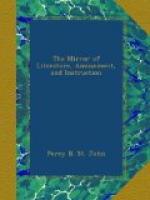A stone coffin, supposed to be that of the famous Michael Scott, the wizard, was found in the small aisle on the south of the chancel in 1812. It was authenticated that his remains had been laid here. There was an altar erected to say mass for his soul. The length of the skeleton was six feet. A stone head at the foot of the coffin bears a very rude wizard-like appearance. Alexander II. and many of the Scottish kings and nobles are buried here. The best view is obtained of the building from the south east, which, indeed, commands the whole of the ruin. The village contains 500 or 600 inhabitants, and is 35 miles distant from Edinburgh. The remains of several Roman camps are to be seen in its neighbourhood, and one of the hills bears the marks of having been a volcano. Sir Walter Scott’s residence at Abbotsford is within a few miles.
VYVYAN.
* * * * *
ON WAITS.
(To the Editor of the Mirror.)
MR. EDITOR,—It may not be unacceptable to many of your readers to receive some elucidation of a custom which is still prevalent at the present season. I allude to the waits, who visit us in the month of December, with instrumental music, going from house to house.
Waites, or waits, formerly wayghtes is derived from the latter noun, and originally signified hautbois, (or hautbois, as we have it in English,) of which it is not unworthy remark, there is no singular number. From the instrument its signification was, after a time, transferred to the performers themselves; concerning whom, it is well known,.the appellation is now applied to all who follow the practice above adverted to, especially those who, at the approach of. Christmas, salute us with their nightly concerts.
The wayghtes of ancient times were, as some historians say, so called, because they attended or waited on potentates, judges, magistrates, and bodies corporate, pomp and processions, &c.; they were also sometimes appointed to keep a sort of Watch at night, and were then generally decorated with superb dresses, splendid cloaks, &c. In Rymers’ Fardera there is an account of such an establishment, of the minstrels and waites who were in the service of the court of Edward IV., wherein is mentioned “a waite that nighteleye, from Michaelmas to Shrove Thorsday, pipeth the watch within this court;” “i. fewer times, in the somere nightes iij. times.” Todd derives the term waits from wahts, (Goth.) nocturnal itinerant musicians, (Beaumont and Fletcher;) Bayley, on account of their waiting on magistrates, &c.; or of guet, a watch; or from the French guetter, to watch, because anciently they kept a sort of watch a night. From what I have narrated, then, it appears that the persons formerly called waites, or waits, were musical watchmen, the word implying obees. They were, in fact, minstrels, at first annexed to the




